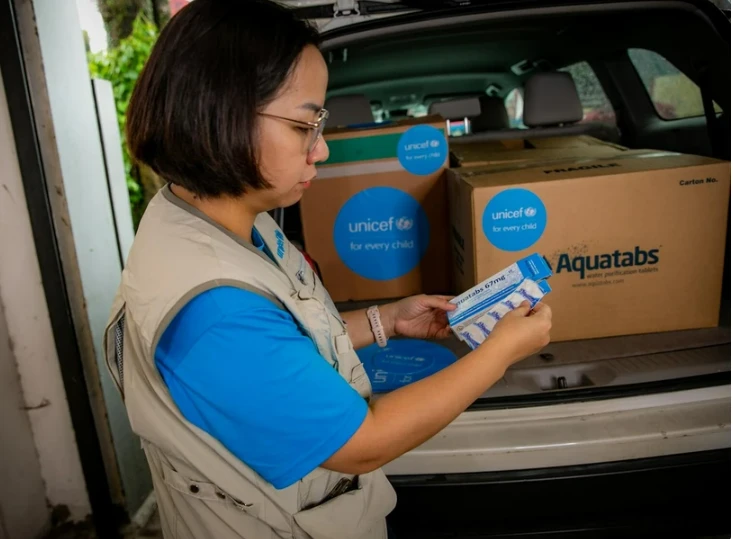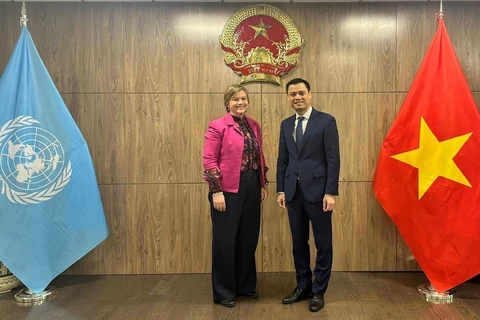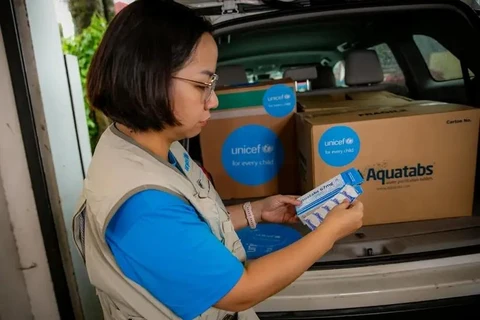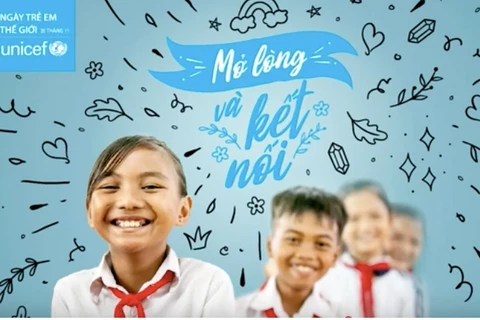
Hanoi (VNA) - The United Nations Children's Fund (UNICEF) has provided water supplies to the authorities of the three localities most severely affected by Typhoon Yagi, in order to support households, hospitals, healthcare facilities, and schools in those areas.
Super typhoon Yagi was the strongest storm to hit Vietnam in decades. It made landfall on September 7, causing severe damage, widespread flooding, landslides, and flash floods in many areas.
Undertaking emergency measures, UNICEF Vietnam quickly transported 80,000 water purification tablets for the Centre of Disease Control in Thai Nguyen province and 4,000 litres of water to the Lao Cai provincial Hospital to ensure the supply of drinking water for 800 people.
In the coming days, UNICEF will provide more water purification tablets, water tanks, ceramic filters, hand sanitizers and soap to households, schools and healthcare facilities in Yen Bai and Lao Cai provinces.
“We have already started to deliver life-saving support and are mobilising resources to address the massive needs. Too many children have had their access to essential services like clean water, sanitation, healthcare and education cut off. Swift action is needed to restore these lifelines as soon as possible. The devastation caused by the typhoon is a tragic reminder of the disproportionate impact extreme weather events, intensified by climate change, have on children,” said Silvia Danailov, Chief Representative of UNICEF in Vietnam.
UNICEF is committed to urgently providing sustained support to the Government of Vietnam to ensure children and families have access to essential services, she stated.
Nearly 19 million people, including 5.5 million children, live in the hardest-hit cities and provinces of Lao Cai, Tuyen Quang, Cao Bang, Yen Bai, Quang Ninh, Hai Phong, Hanoi, Thai Binh, Hai Duong, Hoa Binh, Thai Nguyen and Phu Tho.
Typhoon Yagi ravaged 26 northern localities, leaving 324 people dead and missing, including 24 children. It has damaged an estimated 141,469 homes, 550 health facilities and 805 schools, while around 400,000 homes had their safe water supply cut off.
Approximately 2 million children have been left without access to education, psychosocial support and school feeding programmes.

National authorities have issued a warning for continued heavy rain, with flash floods and landslides still devastating villages and communities in the northern provinces of the country which are home to a large number of vulnerable communities, including ethnic minorities.
In response to the Government's strong and commendable efforts to address the disaster's impact, UNICEF is focusing on several key interventions, including water, sanitation supplies and safe storage solutions to households, health facilities and schools.
The organisation is also delivering emergency medical supplies such as vaccines, malnutrition treatments, nutrition supplements and hygiene kits to health centres in the most affected areas.
To support the reopening of schools, it is offering temporary learning spaces and educational materials for children affected by the trauma of the disaster. Additionally, emergency kits containing essential items, including educational tools and support materials, are being distributed to children and families.

UNICEF is also providing humanitarian cash assistance to the most vulnerable households, particularly those with children and pregnant women, helping them meet urgent needs and recover more quickly from disasters.
It is currently mobilising resources to ensure emergency aid is urgently provided. An initial 11 million USD is urgently required to be able to deliver on its mandate to assist the most vulnerable children./.






















